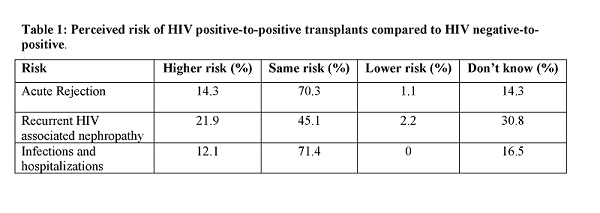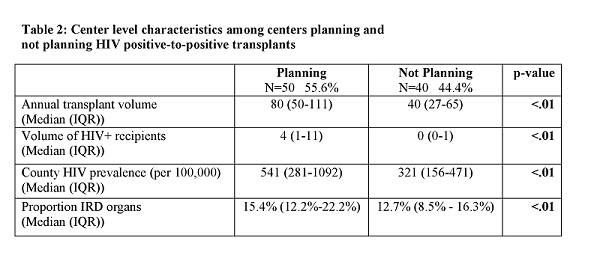Transplant Center Knowledge and Planned Practice of HIV Positive-to-Positive Transplants.
JHU, Baltimore
Meeting: 2017 American Transplant Congress
Abstract number: D285
Keywords: HIV virus
Session Information
Session Name: Poster Session D: Non-Organ Specific: Economics, Public Policy, Allocation, Ethics
Session Type: Poster Session
Date: Tuesday, May 2, 2017
Session Time: 6:00pm-7:00pm
 Presentation Time: 6:00pm-7:00pm
Presentation Time: 6:00pm-7:00pm
Location: Hall D1
Background: The HIV Organ Policy Equity (HOPE) Act (2013) allows deceased and living donor transplantation of HIV-infected (HIV+) organs into HIV+ recipients (HIV-to-HIV) under HRSA research guidelines. In developing the HOPE in Action network, we sought to better understand transplant centers' knowledge and planned-practice of HIV-to-HIV transplants.
Methods: We contacted 204 US adult organ transplant centers from 1/2016-6/2016. Survey recipients were instructed to send the survey to a team member who could represent the center's practice of HIV+ transplantation. Contact information for 5 centers was unavailable. We explored relationships between responses and center characteristics from SRTR using rank-sum tests.
Results: The response rate was 56% (n=114). Most (57%) respondents were transplant surgeons. 9% of centers were unaware that HIV-to-HIV transplants were legal; 21% were unaware these transplants were limited to research. 50 centers planned to perform HIV-to-HIV deceased donor transplants, 64% of which had read the research criteria. 73% of centers believed donor-to-recipient HIV-superinfection is a moderate but manageable risk. Perceived risks of rejection, infection, and hospitalization were comparable to HIV negative-to-positive transplants; perceived risk of post-transplant HIV-associated nephropathy was unknown or higher. Centers planning HIV-to-HIV transplants had higher median transplant volume, HIV+ recipient volume, local HIV prevalence, and use of infectious-risk donor organs. 83% of centers supported HIV+ living donation.
 Conclusions: Many centers plan to perform HIV-to-HIV transplants. Knowledge gaps remain; some centers are still unaware that this practice is legal and restricted to research. There is substantial support for HIV+ living donors. Center education and participation in HOPE in Action will help maximize this novel donor source.
Conclusions: Many centers plan to perform HIV-to-HIV transplants. Knowledge gaps remain; some centers are still unaware that this practice is legal and restricted to research. There is substantial support for HIV+ living donors. Center education and participation in HOPE in Action will help maximize this novel donor source.
CITATION INFORMATION: Rasmussen S, Bowring M, Shaffer A, Durand C, Segev D. Transplant Center Knowledge and Planned Practice of HIV Positive-to-Positive Transplants. Am J Transplant. 2017;17 (suppl 3).
To cite this abstract in AMA style:
Rasmussen S, Bowring M, Shaffer A, Durand C, Segev D. Transplant Center Knowledge and Planned Practice of HIV Positive-to-Positive Transplants. [abstract]. Am J Transplant. 2017; 17 (suppl 3). https://atcmeetingabstracts.com/abstract/transplant-center-knowledge-and-planned-practice-of-hiv-positive-to-positive-transplants/. Accessed February 22, 2026.« Back to 2017 American Transplant Congress
